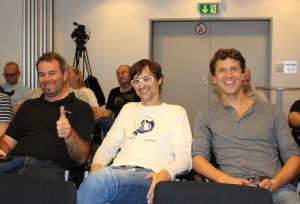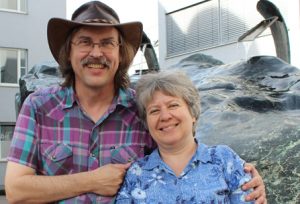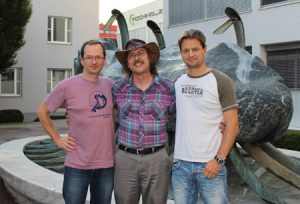Larry Wall, der Erfinder der Programmiersprache Perl, kam mit seiner Frau Gloria, Cowboyhut und bester Laune zum Austrian Perl Workshop 2014 in das Techno-Z Salzburg. Vor seinem Vortrag nahmen sich die beiden Zeit für ein Gespräch über die Anfänge von Perl, Österreich und was auf Programmierer zukommt.
You created Perl 27 years ago. What were the intentions behind?
Larry Wall: I was on a project where I was pretty much on my own as a system administrator and chief programmer. The project was for the NSA, which they then cancelled. We tried to do configuration-management across the country over a very flaky, encrypted link. We were sending a lot of information back and forth and the bosses wanted to get some reports out of the text files to know what was happening.
What tools did you use?
Larry Wall: We were running on early BSD Unix and we didn’t have very powerful tools. I tried prototyping and it just wasn’t working. So I said, I can do better, I know how to write a computer language. Over a period of about nine months I developed this language – just as long as a baby needs until birth. At the end of the time I came out with Perl 1. The problem was that it sort of happened illegally in a secret lab. Perl wasn´t classified. But neither the company nor the NSA cared about it. Technically they could have put me into prison (laughs). Now, there are ways for people to open source and release things. But back then nobody figured out how to do that.
Did you expect this success?
Larry Wall: Yes and no. I had released a couple of programs before. I thought that people would like it, but in terms of how the language developed and its capabilities it surprised me.

What do you expect from Perl-workshops like Salzburg?
Larry Wall: I want to encourage people. These days most of the work is done by young brainy people. I try to supervise things, if I see that something is going wrong, either technically or socially. I have now time to pick out some small part of the problem and work on it.
It is right, that your wife Gloria is responsible for your decision to come to Salzburg?
Gloria Wall: Yes, I actually do all the arrangings. 20 years ago we were here for the first time and we both thought it would be great to come back. Last week we spent in Maria Alm. We drove over the Grossglockner Hochalpenstraße.

What do Americans think of Austria apart from Schwarzenegger and Mozart?
Gloria Wall: Well, Sound of Music (laughs). In America people don’t really make a lot of distinctions where you are from. A lot of people hardly even know the difference between Austria and Germany. I guess lot of Austrians, who come over are bright folks.
What is your impression of Techno-Z?
Gloria Wall: We live in the middle of Silicon Valley. This would be about like the Google Campus.
We have 90 small and medium sized companies here.
Larry Wall: We would call that an incubator. Small companies that hope to become larger companies. I’ve been involved in start-ups in Silicon Valley. I am mentoring companies. Maybe one out of 10 succeeds.
How did computer programming change over the past years?
Gloria Wall: My father worked on the very first computer that was not owned by the government. In fact, his job title was computer. He sat and did calculations all day. So I’ve been watching this from the very beginning.
First it used to be all numbers, all maths. Then it changed over to thinking in algorithms: first you do this, than you do that. Now it is more becoming how you really define your problem, without telling the computer how to solve the problem.
Larry Wall: It is about how to get the programmers to say what they want and not to overspecify it, so that the computer makes bad decisions. An example: If you are going to sort something, you might tell a computer how to sort it. But the computer might actually be smart enough to sort it faster than that. But if you have told the computer to sort it exactly that way you cannot do anything with that.
A lot of our job is now teaching programmers when to not care about things they used to care about.
Will a computer overrule human decisions?
Larry Wall: There is always that fear! For example: In Austria we drove around with a navigator. Sometimes you follow its suggestions, sometimes not. Of course there have to be ways of overruling a machine.
Thank you very much for this interview!

Monika Sturmer
Techno-Z Verbund GmbH
Seit 2011 im Techno-Z. Interessiert an allen Themen und News rund um den Technologie-, Innovations- und Wirtschaftsstandort. Redaktion Techno-Z Blog und Ansprechpartnerin für Blogautor*innen aus der Techno-Z Community.
Diesen Beitrag teilen:
17. Juli 2024
Empathischer Roboter hilft älteren Personen
Larry Wall, der Erfinder der Programmiersprache Perl, kam mit seiner Frau Gloria, Cowboyhut und bester Laune zum Austrian Perl Workshop 2014 in das Techno-Z Salzburg. Vor seinem Vortrag nahmen sich die beiden Zeit für ein Gespräch über die Anfänge von Perl, Österreich und was auf Programmierer zukommt.
You created Perl 27 years ago. What were the intentions behind?
Larry Wall: I was on a project where I was pretty much on my own as a system administrator and chief programmer. The project was for the NSA, which they then cancelled. We tried to do configuration-management across the country over a very flaky, encrypted link. We were sending a lot of information back and forth and the bosses wanted to get some reports out of the text files to know what was happening.
What tools did you use?
Larry Wall: We were running on early BSD Unix and we didn’t have very powerful tools. I tried prototyping and it just wasn’t working. So I said, I can do better, I know how to write a computer language. Over a period of about nine months I developed this language – just as long as a baby needs until birth. At the end of the time I came out with Perl 1. The problem was that it sort of happened illegally in a secret lab. Perl wasn´t classified. But neither the company nor the NSA cared about it. Technically they could have put me into prison (laughs). Now, there are ways for people to open source and release things. But back then nobody figured out how to do that.
Did you expect this success?
Larry Wall: Yes and no. I had released a couple of programs before. I thought that people would like it, but in terms of how the language developed and its capabilities it surprised me.

What do you expect from Perl-workshops like Salzburg?
Larry Wall: I want to encourage people. These days most of the work is done by young brainy people. I try to supervise things, if I see that something is going wrong, either technically or socially. I have now time to pick out some small part of the problem and work on it.
It is right, that your wife Gloria is responsible for your decision to come to Salzburg?
Gloria Wall: Yes, I actually do all the arrangings. 20 years ago we were here for the first time and we both thought it would be great to come back. Last week we spent in Maria Alm. We drove over the Grossglockner Hochalpenstraße.

What do Americans think of Austria apart from Schwarzenegger and Mozart?
Gloria Wall: Well, Sound of Music (laughs). In America people don’t really make a lot of distinctions where you are from. A lot of people hardly even know the difference between Austria and Germany. I guess lot of Austrians, who come over are bright folks.
What is your impression of Techno-Z?
Gloria Wall: We live in the middle of Silicon Valley. This would be about like the Google Campus.
We have 90 small and medium sized companies here.
Larry Wall: We would call that an incubator. Small companies that hope to become larger companies. I’ve been involved in start-ups in Silicon Valley. I am mentoring companies. Maybe one out of 10 succeeds.
How did computer programming change over the past years?
Gloria Wall: My father worked on the very first computer that was not owned by the government. In fact, his job title was computer. He sat and did calculations all day. So I’ve been watching this from the very beginning.
First it used to be all numbers, all maths. Then it changed over to thinking in algorithms: first you do this, than you do that. Now it is more becoming how you really define your problem, without telling the computer how to solve the problem.
Larry Wall: It is about how to get the programmers to say what they want and not to overspecify it, so that the computer makes bad decisions. An example: If you are going to sort something, you might tell a computer how to sort it. But the computer might actually be smart enough to sort it faster than that. But if you have told the computer to sort it exactly that way you cannot do anything with that.
A lot of our job is now teaching programmers when to not care about things they used to care about.
Will a computer overrule human decisions?
Larry Wall: There is always that fear! For example: In Austria we drove around with a navigator. Sometimes you follow its suggestions, sometimes not. Of course there have to be ways of overruling a machine.
Thank you very much for this interview!

Monika Sturmer
Techno-Z Verbund GmbH
Seit 2011 im Techno-Z. Interessiert an allen Themen und News rund um den Technologie-, Innovations- und Wirtschaftsstandort. Redaktion Techno-Z Blog und Ansprechpartnerin für Blogautor*innen aus der Techno-Z Community.
Diesen Beitrag teilen:
17. Juli 2024
